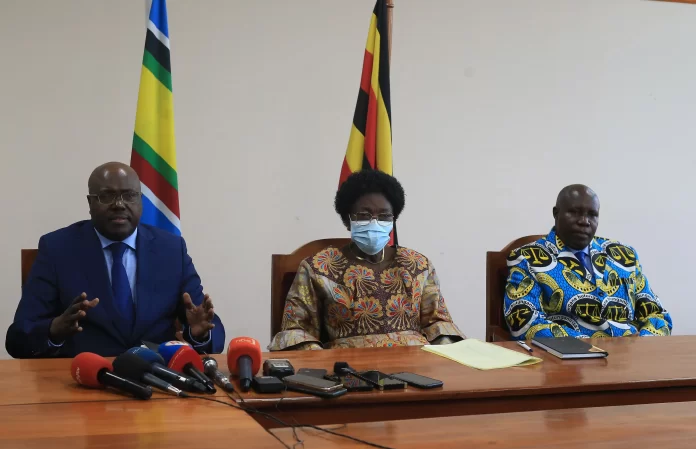
Uganda is planning to introduce Kiswahili language teaching in Primary schools and make it a compulsory subject so as to build a strong foundation in learners before they progress to secondary level.
Rebecca Alitwala Kadaga, the first Deputy Prime Minister and also the Minister for East African Affairs, addressed journalists on Wednesday, July 5, 2023, at Kampala Kingdom Hall as Uganda prepares to host Kiswahili Language Day under the theme of “Unleashing Kiswahili’s Potential in the Digital Era.”
Kadaga noted that arrangements to recruit more teachers for the Kiswahili language are underway to ensure that it is adopted and embraced nationally.
“Kiswahili is a language of our own people that must be promoted extensively. Ugandans must embrace Kiswahili without hesitation,” Kadaga said.
Joseph Ntakirutimana, the Speaker of the East African Legislative Assembly, intends to amend the treaty policy to allow EALA Members to debate in Kiswahili.
“The language barrier has been a challenge while debating in the house due to Article 137, which permits English as the only language to be used during debate. We intend to have it amended soon to allow members to debate in Kiswahili,” Ntakirutimana said.
He commended the government of Uganda for taking bold actions in promoting the Kiswahili language and adopting it as the national language.
Dr. Caroline Asiimwe, the East African Kiswahili Commission Executive Secretary, noted that Uganda has more trained Kiswahili language teachers than all the EAC Member states, according to the Capacity Assessment of Development on the Use of Kiswahili in the Region.
She called for a change in negative attitudes towards language and considering it as being used by bad people, adding that such must be addressed.
Andrea Agwer Agiik, the EAC Deputy Secretary General, said Kiswahili is the only language that can promote unity and free engagement among African people.
“Kiswahili reflects our values and culture, and it portrays African uniqueness, beauty, and aspirations,” Agwer said.
According to UNESCO, Kiswahili is a language that speaks to both past and present. With over 200 million speakers, it is one of the most widely used African languages, encompassing more than a dozen main dialects.
Over the centuries, this Bantu language has emerged as a common form of communication in many parts of sub-Saharan Africa, in addition to the Middle East.
The United Nations General Assembly, through its resolution 71/328 of September 11, 2017, on multilingualism, welcomed the implementation of a day dedicated to each of its official languages in order to inform and raise awareness of their history, culture, and use, and encouraged the Secretary-General and institutions such as UNESCO to consider extending this important initiative to other non-official languages spoken throughout the world.
In that regard, the 41st session of the General Conference of UNESCO adopted resolution 41 C/61 that recognized the role the Kiswahili language plays in promoting cultural diversity, creating awareness, and fostering dialogue among civilizations and noted the need to promote multilingualism as a core value of the United Nations, and an essential factor in harmonious communication between peoples.
This promotes unity in diversity and international understanding, tolerance, and dialogue.
The resolution proclaimed July 7 of each year as World Kiswahili Language Day. Kiswahili is the first African language to be recognized in this manner by the UN.














